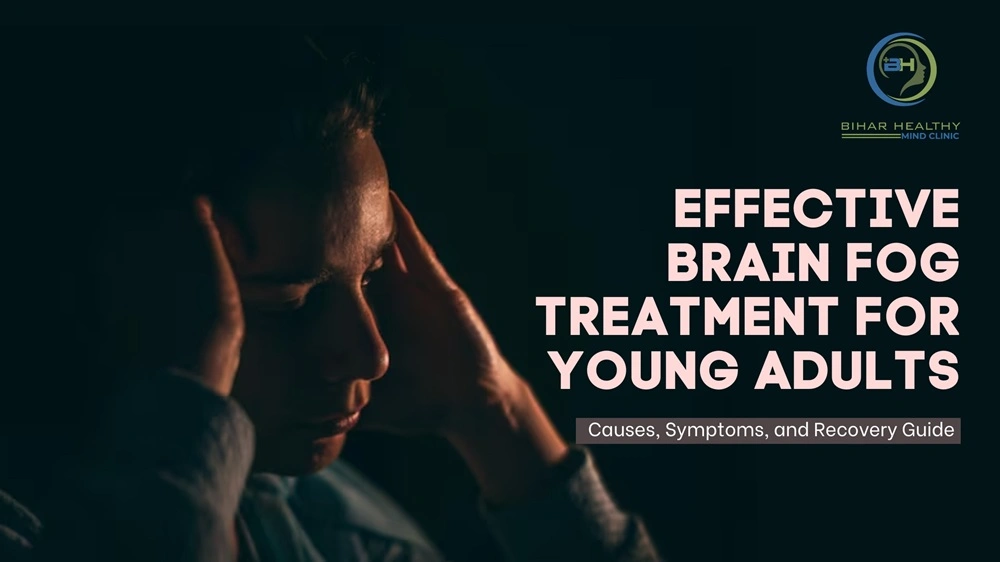
Do you often catch yourself thinking, “I feel like my brain is not working properly” or struggling to focus on simple tasks? Many young adults today experience this condition, commonly known as brain fog. It’s not a medical diagnosis in itself but rather a sign that your brain is struggling to process information efficiently.
At Patna Psychiatry, Dr. Saurabh Kumar, MD (Psychiatry), offers specialized brain fog treatment to help patients regain focus, mental sharpness, and overall cognitive health. This blog explains the causes, symptoms, and effective ways on how to treat brain fog and how to overcome brain fog safely and permanently.
What Is Brain Fog?
Brain fog refers to a state of mental confusion or lack of clarity. People often describe it as feeling “mentally cloudy,” “sluggish,” or “unable to think clearly.” You may feel that your brain is not working properly, memory feels weak, and concentration takes extra effort.
While occasional brain fog can result from tiredness or stress, persistent fogginess signals an underlying issue that requires attention. Seeking professional guidance from the best psychiatrist in Patna ensures proper diagnosis and treatment.
Common Causes of Brain Fog in Young Adults
There are multiple reasons why young adults experience cognitive dullness. Understanding the root cause is essential before beginning any brain fog treatment.
1. Sleep Deprivation
Lack of sleep disrupts your brain’s ability to consolidate memories and process information. If you regularly feel that your brain is not working, poor sleep hygiene could be the cause.
2. Chronic Stress and Anxiety
Continuous stress floods your brain with cortisol, a hormone that impairs focus and decision-making. Learning how to stop brain fog begins with managing emotional stress.
3. Poor Nutrition
An imbalanced diet lacking vitamins (especially B12 and D), iron, and omega-3 fatty acids can contribute to mental fatigue. Brain cells need proper nourishment to function effectively.
4. Dehydration
Even mild dehydration can cause the feeling that “my brain is not working.” Water plays a vital role in maintaining neural function.
5. Hormonal Imbalance
Young adults, especially women, may experience brain fog due to hormonal changes linked to menstrual cycles, thyroid disorders, or contraceptive use.
6. Screen Overload and Lack of Exercise
Spending long hours on screens and avoiding physical activity leads to reduced oxygen supply and increased mental exhaustion.
7. Mental Health Conditions
Conditions like depression, ADHD, or anxiety disorders can cause cognitive slowing. Consulting the best psychiatrist in Patna is vital for accurate evaluation and personalized brain fog treatment.
-
Common Symptoms of Brain Fog:
- Difficulty concentrating or remembering details
- Feeling “spaced out” or detached
- Frequent forgetfulness
- Inability to multitask
- Mental exhaustion after minimal effort
If you often think, “my brain is not working like before”, it’s time to explore how to cure brain fog with professional support.
How to Cure Brain Fog: Professional and Lifestyle Approaches
A proper brain fog cure involves identifying the underlying cause and creating a holistic plan that addresses both physical and psychological factors.
1. Psychiatric and Psychological Evaluation
At Patna Psychiatry, Dr. Saurabh Kumar, MD (Psychiatry), conducts a detailed assessment to identify whether the cause is psychological, neurological, or lifestyle-related. Once diagnosed, customized therapies or medications are recommended for effective brain fog treatment.
2. Therapy and Counseling
Cognitive Behavioral Therapy (CBT) helps patients learn how to overcome brain fog caused by stress, anxiety, or emotional strain. It enhances clarity, resilience, and focus.
3. Medication (If Required)
In some cases, underlying depression, anxiety, or ADHD might require medical treatment. Appropriate medication can help eliminate brain fog and restore cognitive function.
4. Nutritional Modifications
Include brain-boosting foods like fatty fish, eggs, nuts, leafy greens, and berries. Supplements such as Vitamin B12, D, and magnesium can also support a brain fog solution when advised by a professional.
5. Mindfulness and Meditation
Practices like yoga, meditation, and breathing exercises reduce stress hormones and improve oxygen flow to the brain, helping you learn how to avoid brain fog naturally.
6. Proper Sleep Routine
Getting 7-8 hours of sleep each night is one of the simplest ways to stop brain fog and enhance focus.
7. Digital Detox and Physical Activity
Regular exercise increases blood flow and promotes mental clarity. Reducing screen time helps the mind reset, especially for students and professionals feeling that their brain is not working properly due to overexposure.
When to See a Psychiatrist
If you have persistent symptoms and often think “I feel like my brain is not working properly,” it’s important to consult a mental health professional. Prolonged brain fog could be an early sign of anxiety, depression, ADHD, or other cognitive disorders.
Dr. Saurabh Kumar, the best psychiatrist in Patna, provides evidence-based, confidential, and compassionate care. With his expertise, patients not only learn how to treat brain fog effectively but also regain confidence in their mental performance.
-
How to Avoid Brain Fog in the Future
- Maintain a consistent sleep schedule.
- Stay hydrated and eat nutritious meals.
- Limit caffeine and alcohol intake.
- Engage in daily exercise and outdoor activities.
- Schedule breaks during work or study sessions.
- Practice relaxation techniques like deep breathing.
- Stay socially connected and share your thoughts with trusted people.
These steps can help you eliminate brain fog and maintain mental balance long term.
Conclusion
Brain fog is a common yet manageable problem among young adults. Whether you’re dealing with stress, hormonal issues, or lifestyle imbalance, understanding how to cure brain fog is the first step toward recovery.
At Patna Psychiatry, Dr. Saurabh Kumar, MD (Psychiatry), offers personalized brain fog treatment plans combining therapy, medication (if needed), and lifestyle coaching. If you feel like your brain is not working properly, don’t ignore the symptoms, seek expert guidance today and rediscover mental clarity.
Visitors: 56





No comments yet.